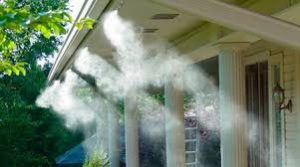23
May
Connecticut State Legislature Bans Residential Mosquito Misters
 (Beyond Pesticides, May 23, 2018) Earlier this month, the Connecticut state legislature voted to ban the use of residential pesticide misting systems. (These are devices that are typically placed outdoors and spray insecticides –mostly in an attempt to control mosquitoes.) This is the latest move from a state legislature that has also recently banned the use of bee-toxic neonicotinoids and stopped the use of hazardous lawn care pesticides on public playgrounds. The vote was unanimous in the state Senate, and won by a count of 132-17 in the state House. The bill is set to become law on May 24, unless Governor Malloy vetoes the legislation, which is not expected.
(Beyond Pesticides, May 23, 2018) Earlier this month, the Connecticut state legislature voted to ban the use of residential pesticide misting systems. (These are devices that are typically placed outdoors and spray insecticides –mostly in an attempt to control mosquitoes.) This is the latest move from a state legislature that has also recently banned the use of bee-toxic neonicotinoids and stopped the use of hazardous lawn care pesticides on public playgrounds. The vote was unanimous in the state Senate, and won by a count of 132-17 in the state House. The bill is set to become law on May 24, unless Governor Malloy vetoes the legislation, which is not expected.
Pesticide misters are machines primarily used to spray mosquito adulticides. Many health advocates have expressed concern that these products, able to spray toxic pesticides on a timer at regular intervals, pose a significant risk to pets and children who can be directly in the path of a mister’s spray. The chemicals employed in these machines are often synthetic pyrethroids, which have been linked to a range of human health effects, from early puberty in boys, to behavioral disorders, learning problems, ADHD, and certain cancers. Neighbors who do not want to be exposed to these chemicals are also put at risk from pesticide drift.
Nancy Alderman, president of the Connecticut nonprofit Environment and Human Health, the organization that supported the legislation, said: “Mosquito misting devises are extremely dangerous and there were absolutely no regulations to control them. They spray toxic insecticides on a continual basis at heights that could spray children and pets. EPA does not regulate them, declaring they can only regulate pesticides – not the appliances that spray them. States therefore are left to do something about these dangerous appliances. There is no way to regulate them – they are so dangerous they must be banned. These pesticide misting devices go off every few minutes spraying toxic pesticides. Because they are often installed around the perimeter of a yard, they affect neighbors who have no way to protect themselves or their pets. The pesticides used in them are toxic to bees.”
These machines also endanger pollinators that may be foraging in an area where these devices are used. Studies find that sublethal concentrations of synthetic pyrethroids can significantly reduce bee fecundity and decrease the rate at which bees develop to adulthood and reproduce. Several field and laboratory studies using pyrethroids have consistently documented decreases in foraging activity and activity at the hive entrance after exposure.
While pesticides are regulated by the U.S. Environmental Protection Agency (EPA), pesticide misters and other application devices are not subject to EPA oversight. This leaves states with the authority to control their use. Connecticut appears to be the first state to restrict these machines through legislation. The state of New York took an administrative approach to regulating these devices, as the commissioner of the state’s Department of Environmental Conservation used his authority to deem pesticides used in misting systems as restricted use (only available to certified applicators).
In 2015, Public Employees for Environmental Responsbility (PEER) filed a complaint with the Federal Trade Commission, detailing false and deceptive claims by manufacturers of pesticide misters. Specifically, PEER noted that manufacturers claim that these misters i) are effective in controlling mosquitoes despite contention from experts and even the American Mosquito Control Association that they are not effective, ii) have the ability to kill ticks, of which there is no evidence, and iii) are “safe” and “natural,” despite their use of highly toxic pesticides. Absent federal action, the responsibility to regulate these dangerous devices falls to the states.
Staying mosquito-free in one’s backyard requires both individual and community efforts. For the individual, during mosquito season use least-toxic repellents like oil of lemon eucalyptus. If possible, wear loose, light colored long-sleeved clothing. If you want to spend protected periods outside sipping lemonade during a hot summer day, sit next to an oscillating fan, as mosquitoes are not great fliers. Or, for more effective management, sit inside a screened in deck, or more economical pop-up tent.
At the community level, you can achieve neighborhood-level reductions in mosquitoes by joining with your neighbors in regularly dumping out standing water or larvaciding sites that cannot be drained. Most common mosquitoes don’t fly too far from where they hatched, and often one location in a community, such as stagnant water in a neighbor’s old pool, can be a major vector for mosquito breeding throughout the neighborhood.
Use Beyond Pesticides’ mosquito doorknob hangers to get the word out. Contact the office for 25 free hangers, or purchase more at Beyond Pesticides’ Storefront. If you are concerned about broader aerial or truck-mounted spraying campaigns by governments or vector control districts, also reach out to Beyond Pesticides at [email protected] or 202-543-5450 for organizing strategies to stop toxic mosquito spray in your community.
All unattributed positions and opinions in this piece are those of Beyond Pesticides.
Source: Connecticut General Assembly SB104










